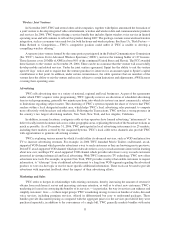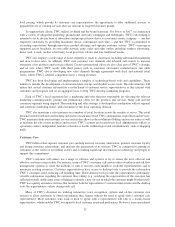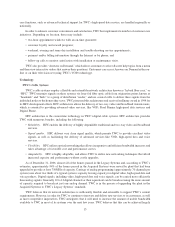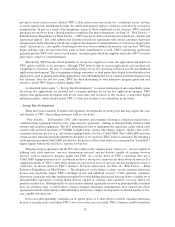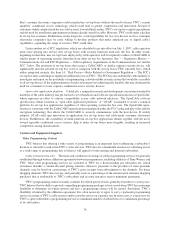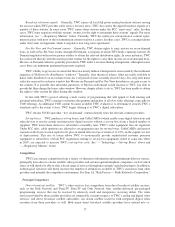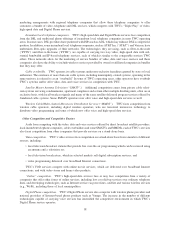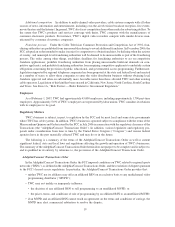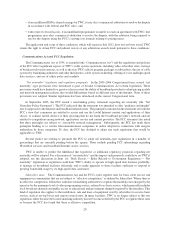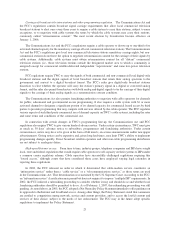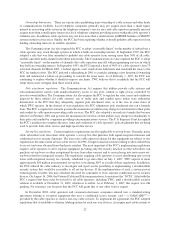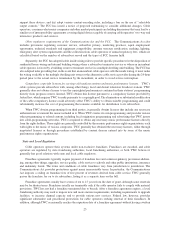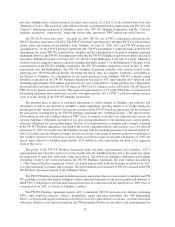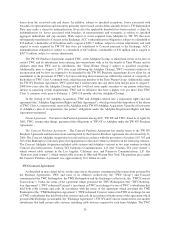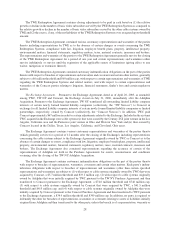Time Warner Cable 2006 Annual Report Download - page 25
Download and view the complete annual report
Please find page 25 of the 2006 Time Warner Cable annual report below. You can navigate through the pages in the report by either clicking on the pages listed below, or by using the keyword search tool below to find specific information within the annual report.• if an unaffiliated RSN is denied carriage by TWC, it may elect commercial arbitration to resolve the dispute
in accordance with federal and FCC rules; and
• with respect to leased access, if an unaffiliated programmer is unable to reach an agreement with TWC, that
programmer may elect commercial arbitration to resolve the dispute, with the arbitrator being required to
resolve the dispute using the FCC’s existing rate formula relating to pricing terms.
The application and scope of these conditions, which will expire in July 2012, have not yet been tested. TWC
retains the right to obtain FCC and judicial review of any arbitration awards made pursuant to these conditions.
Communications Act and FCC Regulation
The Communications Act of 1934, as amended (the “Communications Act”) and the regulations and policies
of the FCC affect significant aspects of TWC’s cable system operations, including video subscriber rates; carriage
of broadcast television stations, as well as the way TWC sells its program packages to subscribers; the use of cable
systems by franchising authorities and other third parties; cable system ownership; offering of voice and high-speed
data services; and use of utility poles and conduits.
“Net neutrality” legislative and regulatory proposals. In the 2005-2006 Congressional term, several “net
neutrality”-type provisions were introduced as part of broader Communications Act reform legislation. These
provisions would have limited to a greater or lesser extent the ability of broadband providers to adopt pricing models
and network management policies that would differentiate based on different uses of the Internet. None of these
provisions was adopted. Similar legislation has been introduced in the current Congressional term.
In September 2005, the FCC issued a non-binding policy statement regarding net neutrality (the “Net
Neutrality Policy Statement”). The FCC indicated that the statement was intended to offer “guidance and insight”
into its approach to the Internet and broadband related issues. The principles contained in the statement set forth the
FCC’s view that consumers are entitled to access and use the lawful Internet content and applications of their
choice, to connect lawful devices of their choosing that do not harm the broadband provider’s network and are
entitled to competition among network, application, service and content providers. The FCC statement also noted
that these principles are subject to “reasonable network management.” Subsequently, the FCC has made these
principles binding as to certain telecommunications companies in orders adopted in connection with mergers
undertaken by those companies. To date, the FCC has declined to adopt any such regulations that would be
applicable to TWC.
Several parties are seeking to persuade the FCC to adopt net neutrality-type regulations in a number of
proceedings that are currently pending before the agency. These include pending FCC rulemakings regarding
IP-enabled services and broadband Internet access services.
TWC is unable to predict the likelihood that legislative or additional regulatory proposals regarding net
neutrality will be adopted. For a discussion of “net neutrality” and the impact such proposals could have on TWC if
adopted, see the discussion in Item 1A, “Risk Factors — Risks Related to Government Regulation — “Net
neutrality” legislation or regulation could limit TWC’s ability to operate its high-speed data business profitably,
to manage its broadband facilities efficiently and to make upgrades to those facilities sufficient to respond to
growing bandwidth usage by its high-speed data customers.”
Subscriber rates. The Communications Act and the FCC’s rules regulate rates for basic cable service and
equipment in communities that are not subject to “effective competition,” as defined by federal law. Where there is
no effective competition, federal law authorizes franchising authorities to regulate the monthly rates charged by the
operator for the minimum level of video programming service, referred to as basic service, which generally includes
local broadcast channels and public access or educational and government channels required by the franchise. This
kind of regulation also applies to the installation, sale and lease of equipment used by subscribers to receive basic
service, such as set-top boxes and remote control units. In many localities, TWC is no longer subject to this rate
regulation, either because the local franchising authority has not become certified by the FCC to regulate these rates
or because the FCC has found that there is effective competition.
20



